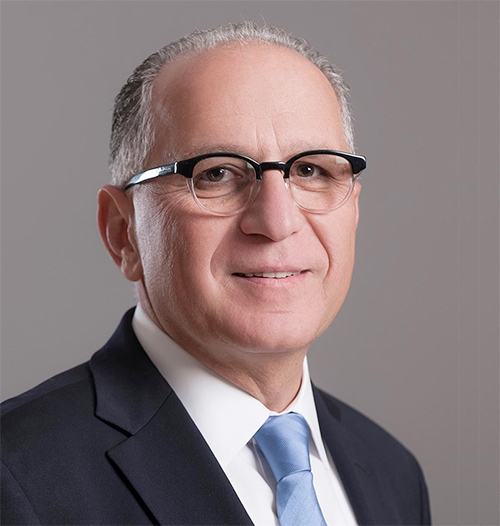Building a sustainable world that works for all
 |
| Nabil Habayeb - Senior vice president, GE, and president & CEO of GE International Markets |
GE has just released its 2021 Sustainability Report, which describes how we are building a world that works today and in the future. To deliver more for our customers and other stakeholders – and to provide technologies that help them do more – all while shrinking our collective environmental impact. In fact, GE has committed to becoming a net-zero company by 2050 – encompassing not just GE’s operations, but also the Scope 3 emissions from the use of our solutions.
This report and our carbon neutral pledge reflect the reality that the way growth was tackled in the past is no longer possible today or in the future.
The field of energy is the most talked about area of sustainability, and with good reason: electricity and heat production account for one-quarter of global greenhouse gas emissions. But it’s also a sector poised for growth, with one billion people still lacking access to reliable power and many more living in emerging markets hungry for more electricity.
This means the world will require lots of new power, and quickly. But the mix of generating technologies must be lower carbon. The fastest way to this low carbon future requires renewable power; coal-to-gas fuel switching, which cuts emissions in half; gas turbines that run on hydrogen; and nuclear power, which has the advantage of generating no CO2 while providing reliable, dispatchable baseload power.
The need also is great in healthcare. Half the world lacks access to essential health services. Governments are working hard to address this, while also seeking to lift the overall quality of care available. At the same time, in many places there are not enough practicing doctors and other clinicians. What’s required is a sustainable approach to healthcare. That means precision healthcare that personalises diagnoses and treatments for more people, powered by digital and AI.
In aviation, cargo traffic is up more than 9 per cent from the comparable 2019 period, while the International Air Transport Association (IATA) predicts average annual passenger growth over the next 20 years could be as high as 3.6 per cent. That’s a growing volume of people and goods, even as the industry is committed to capping net aviation CO2 emissions today and reducing net aviation CO2 emissions by 50 per cent by 2050, relative to 2005 levels.
Conventional aircraft engines will need to become more efficient – including innovations like we recently announced with Safran such as open-fan architectures, hybrid-electric and electric propulsion concepts, and advanced thermal management. They also must adjust to accommodate to new fuels, such as Sustainable Aviation Fuels (SAFs) and hydrogen. Reducing emissions in aviation will also take software that can help pilots and airlines reduce fuel consumption through operational improvements.
Lean-driven sustainability
Sustainability also means taking action to reduce demand and consumption. That’s something GE is doing in its own operations to help us achieve our carbon neutral goals. A crucial tool we’re using to identify and eliminate environmental waste and help reduce our carbon footprint is the lean methodology.
We also are leveraging our 129-year history of innovation to drive a more sustainable future, with GE, customer and partner funded research and development reaching $3.8 billion in 2020. It’s this commitment to research and development (R&D) that has led to breakthrough technologies, such as the Haliade-X turbine, the world’s most powerful offshore wind turbine built today; the world-record setting HA turbine, the most efficient gas turbine; GE’s Edison platform, which enables powerful AI and analytics for better healthcare; and future advances in aircraft engines, such as hybrid-electric or electric propulsion.
We are at a critical moment. Around the world, more communities require more access to energy, healthcare, aviation and other services, but for the first time, we must meet these needs sustainably. Such a complex challenge requires action on many fronts, including areas that don’t seem to have an immediate link to sustainability. Ultimately, it will be innovation in countless sectors that will help us build a sustainable world that works for all.
What the stars mean:
★ Poor ★ ★ Promising ★★★ Good ★★★★ Very good ★★★★★ Exceptional
Related Contents
Latest News
More News
- Addressing Vietnam's energy challenges with aeroderivative gas turbines (February 28, 2023 | 09:33)
- How to sprint ahead in 2023’s worldwide energy priorities (February 08, 2023 | 13:55)
- Boosting Vietnam's grid stability through gas turbine technology (November 22, 2022 | 20:02)
- Healthcare trio collaborates to provide thousands of free breast scans (October 27, 2022 | 17:19)
- GE Healthcare's vision for AI-backed radiology (September 29, 2022 | 11:53)
- GE brand trio to shape the future of key industries (July 19, 2022 | 15:35)
- GE unveiling brand names and defining future (July 19, 2022 | 15:16)
- GE: the shortest route towards sustainability (July 18, 2022 | 08:00)
- Be proactive in an uncertain world (May 20, 2022 | 11:40)
- GE secures first 9HA combined cycle power plant order in Vietnam (May 16, 2022 | 17:06)

 Tag:
Tag:




















 Mobile Version
Mobile Version